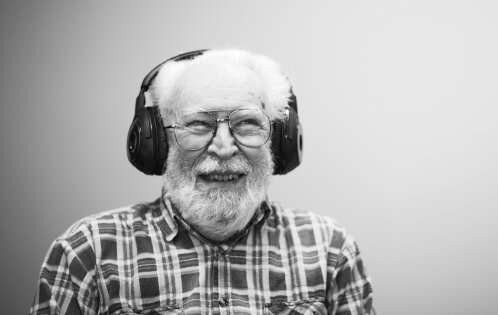New evidence-based guidelines on music for people with dementia

Researchers from Western Sydney University's MARCS Institute for Brain, Behavior and Development have published a new research paper and recommended guidelines for music use for people with dementia after a successful trial program.
28 september 2020--Coinciding with National Dementia Action Week, lead researcher Dr. Sandra Garrido and team have this week published their findings and recommendations in a new paper titled: "Music Playlists for People with Dementia: Trialing A Guide for Caregivers" in the Journal of Alzheimer's Disease Volume (77) Issue (1).
The trial program, funded by the National Health and Medical Research Council of Australia, was developed to look at the effect of music on people with dementia in aged care facilities and home based care to help manage their symptoms, and investigate how music can be utilized in standardized, yet individually tailored, ways.
Dr. Sandra Garrido launched the trial program after hearing reports that some people were having negative responses, or perhaps not responding to music at all, which lead the team to investigate how people's individual symptoms might be interacting with different types of music.
"We wanted to dig deeper to find out more about how individual symptoms might be interacting with different features of music—such as the tempo, or the lyrics, or the mode—so that we could develop a standardized way that music could be used for people with dementia," said Dr. Garrido.
"Music can have really positive effects, but it's important that its used in standardized ways and that it becomes part of standard care practices in aged care facilities," she said.
The program assists carers and families of people with dementia to use and select music effectively by helping them to identify individuals who might be vulnerable to negative responses to music, and identify particular challenges to care that they may be coping with.
"We teach carers and families how to strategically select music that will specifically help them with their individual symptoms and challenges to care, and help caregivers to identify the particular challenges to care and how to use music to help manage them," explains Dr. Garrido.
"Music is something that we all use in everyday life, and aged care facilities typically have some music going for their residents, however music has the potential to offer so much more than just entertainment for people with dementia."
The recommendations within the new research informed guidelines outline how music can be used as a first line treatment to help deal with some of the psychological and behavioral symptoms of dementia that caregivers are struggling to manage every day.
"Of course, we're not recommending that people don't use pharmaceutical medications when necessary, but there is the potential for music to be used in ways that can cut down on the use of psychotropic and anxiolytic medications, for example, to help cope with some of the symptoms of dementia," said Dr. Garrido.
The guidelines were developed based on scientific research conducted at the MARCS Institute for Brain, Behavior and Development in consultation with people with dementia themselves, their care givers, and care staff in aged care facilities.
Training on the guidelines and program is available by contacting Dr. Sandra Garrido, and an online copy of the guidelines, Music Playlists for People with Dementia: A Guide for Carers, Health Workers and Family, is also available.
Explore further
No comments:
Post a Comment